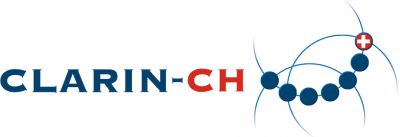Content
This is an old revision of the document!

Università della Svizzera Italiana is represented in the CLARIN-CH Consortium by Prof. Andrea Rocci, from the Institute of Argumentation, Linguistics and Semiotics.
The community from the Università della Svizzera Italiana provides CLARIN-CH expertise in language sciences, and it is actively involved in research projects involving language resources.
Faculties and Departments involved in CLARIN-CH
Faculty of Communication, Culture and Society
1. Institute of Argumentation, Linguistics and Semiotics
Areas of expertise:
- Advertising
- Adult-children argumentation
- Argumentation
- Argumentation and education
- Argumentation in oral discourse
- Argumentation in newsroom interaction
- Argumentation in conflict resolution
- Argumentation in dispute mediation
- Argumentation in business-financial journalism
- Argumentation in discourses on fashion sustainability
- Children's Reasoning
- Collaborative argumentation
- Conflict Resolution
- Discourse structure and discourse relations from the viewpoint of Congruity Theory
- Discourse genres of financial disclosures
- Discourse analysis
- Dispute Mediation
- Equal Opportunity
- Financial Communication
- Financial Journalism
- Intercultural pragmatics and intercultural argumentation
- Interpersonal Communication
- Interpersonal Argumentation
- Linguistics
- Migration
- Modality in argumentation: the semantics, pragmatics and argumentative functions of lexical and morphological expressions of modality and evidentiality
- Multimodal Communication
- Multimodality (e.g., printed documents and audiovisuals)
- Multimodal argumentation
- Newsroom Interaction
- Persuasion
- Public controversies
- Semantics
- Semiotics
- Social media argumentation
- Spoken argumentation
- Visual/multimodal rhetoric
2. Institute of Italian Studies
Areas of expertise:
- Applied Linguistics
- Argumentation
- Bilingualism
- Conversation analysis
- Corpus Linguistics
- Discourse analysis
- Discourse
- French language
- Historical pragmatics
- Italian language
- Language teaching
- Lexical semantics
- Linguistic semantics
- Metapragmatics in relation to conduct and etiquette manuals
- Pragmatics
- Stylistics of literary dialogue
- Text Linguistics
- The pragmatics of politeness and impoliteness
Current research projects
1. The project InfinIta - The categorization of information sources in face-to-face interaction: a study based on the TIGR-corpus of spoken Italian (Prof. Johanna Miecznikowski-Fuenfschilling, Institute of Argumentation, Linguistics and Semiotics, Institute of Italian Studies) is funded by the SNSF (2020-2024). The project investigates categorization of information sources (i.e. direct experience and perception, hearsay, and reasoning) in face-to-face interaction. The project’s main hypothesis is that the communicative relevance of information source in assertions and conjectures is high even in languages that do not force speakers to express it systematically by evidential markers. This hypothesis is put to empirical test in an audio-video corpus of face-to-face interactions in Italian, a language without grammaticalized evidentiality. The TIGR-corpus will be collected in Ticino and in the Grisons. The project team will (a) pragmatically annotate part of the corpus data to produce quantitative data that allow to measure the degree of evidential specificity vs. evidential vagueness of assertions and conjectures; (b) use qualitative methods common in interactional linguistics to study a subset of information sources that are characteristic of face-to-face interaction because they presuppose shared time and space (direct perception in situ, the interlocutors’ discourse, and inferences based on either of these); © use similar qualitative methods to analyze conversational repair targeting information source. [Ongoing]
2.The project APPLY - European network for argumentation and public policy analysis (Prof. Sara Grecco, Institute of Argumentation, Linguistics and Semiotics) is funded by the European and International Programme COST Action (2018-2022). Providing and criticising reasons is indispensable to achieve sound public policy that commands the support of both citizens and stakeholders. The European network for Argumentation and Public PoLicY analysis (APPLY) improves the way European citizens understand, evaluate and contribute to public decision-making on such matters of common concern as climate change or energy policies. Addressing this need from a multidisciplinary perspective on argumentation, the APPLY Action identifies gaps between the citizens’, policymakers’ and scholarly experts’ argumentation, and explores ways of treating them. This occurs through coordinated research activities in three main areas: a) empirical: an argumentative analysis of EU policy documents and procedures, the media and citizens’ discourse results in an annotated pan-European database on institutional and citizens’ argumentation; b) normative: a critical study of concepts and methods to measure the quality of arguments in public policies results in a unified theoretical and methodological framework to analyse and evaluate public policy argument; c) prescriptive: the development of tools by which policymakers, citizens and various stakeholders engage in well-informed argumentative discussions. [Ongoing]
3. The project Mining argumentative patterns in context. A large scale corpus study of Earnings Conference Calls of listed companies (Prof Andrea Rocci, Institute of Argumentation, Linguistics and Semiotics, Institute of Italian Studies) is funded by the SNSF (2021-2025). The proposed research is a large-scale study of argumentative patterns in a corpus of quarterly Earnings Conference Calls (ECCs), a key dialogical genre in the financial communication of listed companies. Corpus research on argumentation, however, requires the development of theory-based annotation schemes and time-consuming annotation by trained analysts, which risks being an insurmountable bottleneck. Furthermore, it requires quantitative analytics to relate analyzed arguments to contextual parameters and, if the effects of argumentation are to be addressed, the possibility to measure change in contextual parameters at appropriate points in time. Recourse to Argumentation Mining and related Argumentation Analytics appears promising, but tools and techniques developed in this growing field have so far seen limited application to research on discourse in context. [Ongoing]
